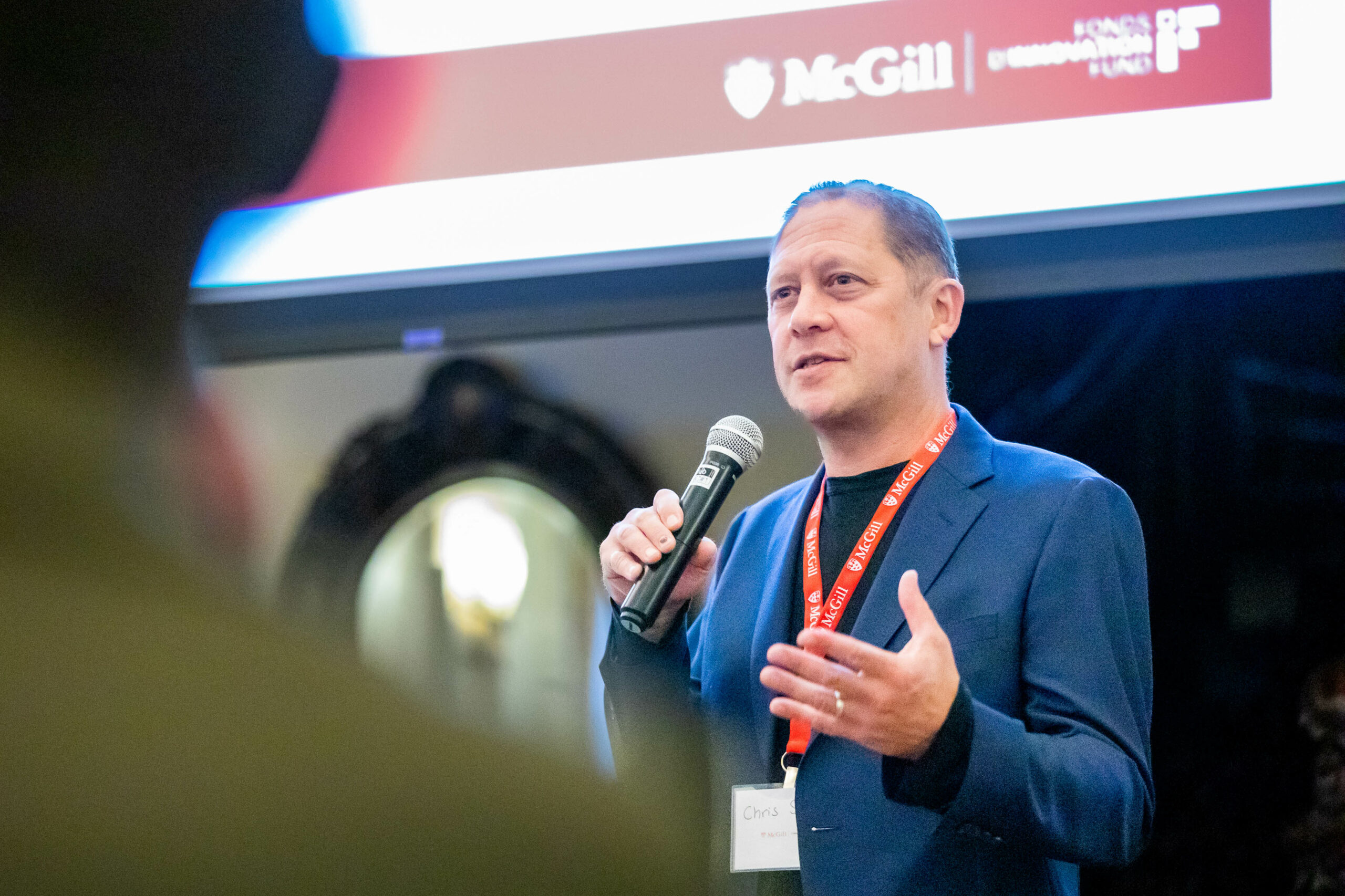
The McGill Innovation Fund (MIF) kicked off its second edition at a festive event held at the venerable McGill Faculty Club last week. A live poll revealed that many of the night’s attendees were interested in applying to the MIF – a promising sign for the fledgling fund.
The event featured a recap of the first edition, in which nine teams had been selected out of a pool of 26 applications. Mark Weber, Director of Office of Innovation + Partnerships, went through each of the selected teams and explained the individual milestones they had achieved since joining the program. Teams in attendance were presented with celebratory T-shirts.
Following the nod to the first cohort, the presentation pivoted to announcing the second edition of the fund. With the key words ‘bigger, better, greener,’ Weber described new features of the new fund. The total value of awards will increase to a maximum of over $500,000, thanks in part to the generosity of alumni donors David Holbrooke and Marc Boghossian, the two founding members of the Lighthouse Circle of donors to the fund. This increased valuation reinforces the message that the MIF is the largest of its kind at McGill, and arguably one of the biggest in Canada.
Discover, develop, deploy
The fund will select teams at three levels of technology readiness: Discover ($25,000), Develop ($50,000) and Deploy ($100,000). The essential requirement all teams must comply with to apply is that projects must have an associated Report of Invention filed and approved with the Office of Innovation + Partnerships (in the case of the Deploy stage, applicants must have a license agreement with McGill University).
The support program that accompanies the award will also be streamlined, with a condensed process to match recipients with advisors who will eventually form advisory boards for the selected teams. Similarly, providing subsidized student interns to recipient teams will also be simplified.
Under the ‘greener’ category, Weber explained that a new cleantech prize has been developed, on the request of donor Boghossian. The gift created a $40,000 award which will be used to supplement funds received in the other stages. Judging for this supplement will be handled by a special selection jury, separate from the other juries. Selection days are set for December 5 to 9.
Canada is “best” country for new businesses
Following the fund explanations, the evening turned to an open and off-the-cuff conversation between Weber and guest Chris Stern, CEO of CarbiCrete. Stern related the highlights of his career prior to joining CarbiCrete, a career that had been predominated by “producing a lot of garbage,” he confessed.
Eventually turning to cleantech, Stern launched a solar panel business which he successfully sold, and thus set the stage for his eventual involvement with CarbiCrete. A McGill spinoff, CarbiCrete uses a uniquely green process that uses waste from the steel industry to create Concrete Masonry Units using a carbon-curing technique that effectively traps carbon dioxide in each block permanently, thus solving two environmental problems at the same time.
“Canada is the best country in the world to start a business,” Stern told the audience, who were noticeably surprised to hear this opinion. “The US does not have the same level of government support that we do,” he explained, citing a litany of Canadian programs that help young businesses.
He went on to comment that “over the next thirty years, everyone in this room will see their work increasingly focus on carbon removal.” To him, the climate crisis is more than a mere opportunity – it will become the main theme of the global economy.
Overcoming hurdles
Continuing with the debunking trend, Stern also provided a sobering summary of the life of an entrepreneur. “It may sound glamourous being the CEO of a startup, but it is not,” he said. “No one wants to talk to you, and all you can talk about is one thing,” he explained in comparison to the life of an academic, who is relatively free to study what they wish.
Despite these hurdles, Stern has turned CarbiCrete into a highly successful business worth millions. One factor he cited for their achievements was public relations: “You have to get famous somehow,” he said. “Our story has been told in media around the world and once you have that going, people want to talk to you.”
Another factor that has helped drive their success? The close collaboration with McGill.
“Having McGill as a partner has been great, it’s helped us in so many ways. Whether it’s an IP issue or something technical to overcome, I can get on the phone, and we can sort things out quickly and easily. As a small business, you need partners like that.”
The McGill Innovation Fund is now receiving applications. Deadline for submission is November 18. The first online information session will be September 27, and others will follow in October. Full details and schedule are available at: www.mcgill.ca/innovation/MIF
